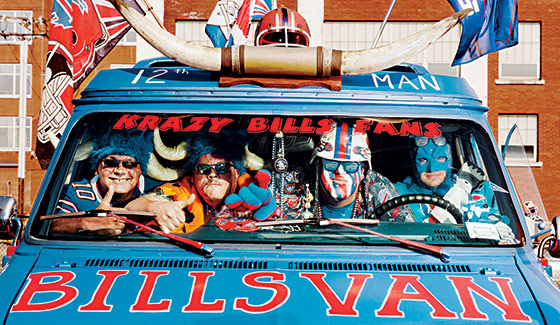 |
(Photo: Christopher Anderson/Magnum Photos/New York Magazine) |
The uprising against Jon Bon Jovi began on the third Wednesday of May. It started in Orchard Park, a Buffalo suburb, but quickly spread throughout the city, then east to Rochester and north toward Niagara Falls, as bars and restaurants and radio stations declared themselves “Bon Jovi–free zones.” There aren’t many American cities more down on their luck than Buffalo. But if the reports were to be believed, Jon Bon Jovi, American rock star, whose most famous song details the life of a union stevedore, was trying to take away one of the few things the city could still brag about—the Buffalo Bills—and move them to Canada. All Buffalo wants, if you will, is to hold on to what its got.
The protest’s inciting incident had occurred two months earlier. In late March, Ralph Wilson, a Michigander who founded the Bills in 1960—he wanted to start a team in Miami but settled for Buffalo—passed away at 95. Wilson left behind a collection of Monets and Manets, which were nice but not nearly as rare or valuable as the football team his estate was now putting up for sale. There are 48 Gutenberg Bibles, but only 32 NFL franchises. Teams rarely go on sale, making ownership one of the most desirable markers of prestige for a certain type of American one-percenter.
The chance to buy an NFL team is so rare that almost from the moment Wilson suffered a bad fall in 2011, putting him in a wheelchair, potential buyers, Bon Jovi included, began positioning themselves. Suitors included a food-service tycoon, a natural-gas magnate, a Manhattan real-estate developer, a bond investor in Santa Monica, the owner of Pabst Blue Ribbon, and Donald Trump, plus unknown bidders who haven’t been publicly identified. Many of the billionaires had little connection to Buffalo—PBR’s owner, for instance, was born in Greece, lives in Greenwich, and had, several years earlier, tried to buy the Jacksonville Jaguars. The chief executive of Erie County, which owns the Bills’ stadium, said that only half of the interested buyers were also interested in keeping the team in town. Morgan Stanley, the firm charged with brokering the sale, was tasked in part with finding even more buyers who’d never thought much about the Bills but might be interested in owning a football team in Los Angeles, San Antonio, Portland, or any of the other glitzier, more profitable markets currently without an NFL team. “I know that there are very financially capable prospective bidders who are looking at this,” one sports-management consultant with knowledge of the deal has said, spooking the city. “ ‘Substantial’ is not a strong enough term to describe their wealth and fluidity.”
New Jersey’s favorite hair rocker was the most tangible threat. Bon Jovi has no great love for the Bills: He’s a Giants fan, and was even standing on the team’s sidelines in 1991, when Bills kicker Scott Norwood missed a game-winning field goal against the Giants in the Super Bowl—an event, it’s worth noting, that is the worst football memory for pretty much every Buffalo Bills fan. But he was a founding owner of the Philadelphia Soul, of the Arena Football League, and has maintained a long-standing interest in owning an NFL team. In 2011, he tried to buy a minority stake in the Atlanta Falcons, and he remains friends with a number of NFL owners, including Dallas’s Jerry Jones, New England’s Robert Kraft, and the Giants’ John Mara, all of whom have endorsed Bon Jovi’s fitness for NFL ownership. (Twenty-four of the league’s 32 owners must approve the sale.) In June, not long after Wilson’s death, Bon Jovi was spotted “talking business” over lunch with NFL commissioner Roger Goodell in Manhattan.
But as rich as Bon Jovi is—his band ranks 13th on Forbes’ “Celebrity 100,” and his personal estimated net worth approaches $300 million—NFL ownership is reserved only for the wealthiest: The Bills are the NFL’s third-least-valuable franchise, ahead of only Jacksonville and Oakland, but are still expected to sell for more than $1 billion. Bon Jovi couldn’t buy the team on his own, so he has teamed up with a group of businessmen in Toronto who own the Maple Leafs, the Raptors, and the Air Canada Centre, where he has played 19 concerts since 2000. (In that span, he’s played Buffalo just three times.) Despite some reports to the contrary, most fans in Buffalo suspect that the group is planning to move the team to Ontario, expanding the NFL’s international reach—one of Goodell’s primary crusades—and ripping out the heart of a city that has hosted professional football for 54 years. While other potential owners were relatively anonymous rich men in suits, Bon Jovi had grown up in New Jersey, and both of his parents are Marines. Aside from the money, the fame, and the hair, he was a guy just like them. Or was he? Suddenly, all that free-floating anger about the market forces poised to rob the town of its team had a clear target.
 Subscribe
Subscribe

 David Edelstein on Essential Documentary The Kill Team
David Edelstein on Essential Documentary The Kill Team
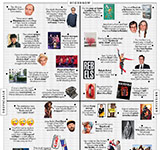 The Approval Matrix
The Approval Matrix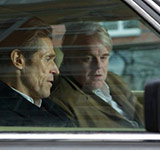 Hoffman at His Peak in Most Wanted Man
Hoffman at His Peak in Most Wanted Man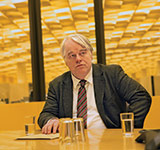 The Year of Posthumous Performances
The Year of Posthumous Performances

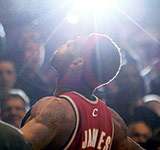 Leitch: Is Data Spoiling Fandom?
Leitch: Is Data Spoiling Fandom?
